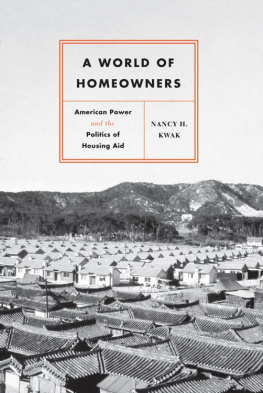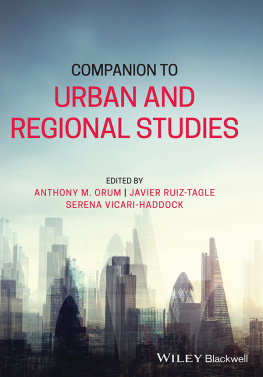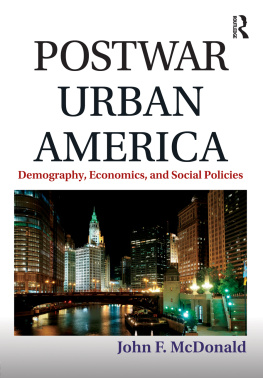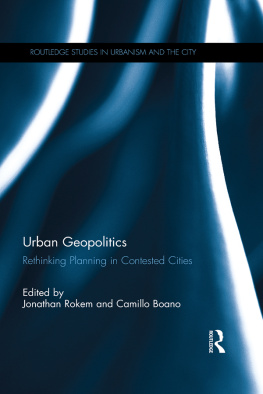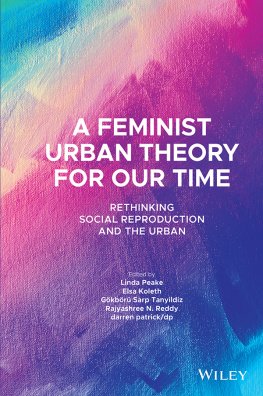A World of Homeowners
Edited by Lilia Fernndez, Timothy J. Gilfoyle, Becky M. Nicolaides, and Amanda Seligman
James R. Grossman, editor emeritus
Also in the series:
Demolition Means Progress: Flint, Michigan, and the Fate of the American Metropolis
By Andrew R. Highsmith
Metropolitan Jews: Politics, Race, and Religion in Postwar Detroit
By Lila Corwin Berman
Blood Runs Green: The Murder that Transfixed Gilded Age Chicago
By Gillian OBrien
A City for Children: Women, Architecture, and the Charitable Landscapes of Oakland, 18501950
By Marta Gutman
A World More Concrete: Real Estate and the Remaking of Jim Crow South Florida
By N. D. B. Connolly
Urban Appetites: Food and Culture in Nineteenth-Century New York
By Cindy R. Lobel
Crucibles of Black Power: Chicagos Neighborhood Politics from the New Deal to Harold Washington
By Jeffrey Helgeson
The Streets of San Francisco: Policing and the Creation of a Cosmopolitan Liberal Politics, 19501972
By Christopher Lowen Agee
Harlem: The Unmaking of a Ghetto
By Camilo Jos Vergara
Planning the Home Front: Building Bombers and Communities at Willow Run
By Sarah Jo Peterson
Purging the Poorest: Public Housing and the Design Politics of Twice-Cleared Communities
By Lawrence J. Vale
Brown in the Windy City: Mexicans and Puerto Ricans in Postwar Chicago
By Lilia Fernandez
Building a Market: The Rise of the Home Improvement Industry, 19141960
By Richard Harris
Segregation: A Global History of Divided Cities
By Carl H. Nightingale
Sundays at Sinai: A Jewish Congregation in Chicago
By Tobias Brinkmann
In the Watches of the Night: Life in the Nocturnal City, 18201930
By Peter C. Baldwin
Miss Cutler and the Case of the Resurrected Horse: Social Work and the Story of Poverty in America, Australia, and Britain
By Mark Peel
The Transatlantic Collapse of Urban Renewal: Postwar Urbanism from New York to Berlin
By Christopher Klemek
Ive Got to Make My Livin: Black Womens Sex Work in Turn-of-the-Century Chicago
By Cynthia M. Blair
A World of Homeowners
American Power and the Politics of Housing Aid
Nancy H. Kwak
The University of Chicago Press
Chicago and London
NANCY H. KWAK is assistant professor of history and urban studies and planning at the University of California, San Diego.
The University of Chicago Press, Chicago 60637
The University of Chicago Press, Ltd., London
2015 by The University of Chicago
All rights reserved. Published 2015.
Printed in the United States of America
24 23 22 21 20 19 18 17 16 15 1 2 3 4 5
ISBN-13: 978-0-226-28235-0 (cloth)
ISBN-13: 978-0-226-28249-7 (e-book)
DOI: 10.7208/chicago/9780226282497.001.0001
Publication of this book has been aided by a grant from the Bevington Fund.
Library of Congress Cataloging-in-Publication Data
Kwak, Nancy H., 1973 author.
A world of homeowners : American power and the politics of housing aid / Nancy H. Kwak.
pages ; cm
Includes bibliographical references and index.
ISBN 978-0-226-28235-0 (cloth : alk. paper)ISBN 978-0-226-28249-7 (ebook) 1. Home ownershipUnited StatesHistory20th century. 2. Home ownershipPolitical aspectsUnited States. 3. Housing policyUnited States. 4. Federal aid to housingUnited StatesHistory20th century. 5. Federal aid to housingPolitical aspectsUnited States. I. Title.
HD7287.82.U6K93 2015
363.5'820973dc23
2015001693
This paper meets the requirements of ANSI/NISO Z39.481992 (Permanence of Paper)
Contents
We have built up in the minds of our peopleand of the worldthe belief that the American system makes it possible for all to live at least at the American minimum standard of decency.
Raymond M. Foley, administrator of the US Housing and Home Finance Agency (1950)
At the end of World War II, American advisors began urging countries around the world to embrace the ideal of mass homeownership. More accessible, mortgage-driven homeownership could simultaneously strengthen democratic governments and capitalism, they argued. The war had decimated some cities and left others with an excess of newcomers and a shortage of building materials. More housing, better housing, was needed everywhere. With large-scale national reconstruction plans in the works, what better time was there to rethink housing policy at the highest levels?
US dominance in the postwar global economy led traveling American advisors and experts to believe they could exert greater influence over the architecture of nascent housing industries around the world. In building a new international language of homeownership, however, these men and women did notindeed, could notimpose their own ideas wholesale. Newly independent or transitional states hardly welcomed another imperial power, and American experts themselves did not concur on all points. Rather, local implementation reflected processes of negotiation. At times, participants in this negotiation were highly unequal, as in cases where US aid money outmuscled local or national considerations; other times, Americans proved surprisingly powerless to implement their ideas on foreign soil. National prejudices could shape policy, but ideas also flowed readily across state lines, with actors observing best practices and learning from each other without regard for national origin. Misinformation and individual caprice played equally important roles in shaping the evolution of global housing finance. The commodification of homes, the legitimization of some forms of ownership over others, the transformation of housing into investment vehicles, and the expansion of global management of housing credit and debt were not inevitable steps in the evolution of capitalism, but rather the products of specific actors and institutions yielding highly variable outcomes.
If housing and financing programs varied greatly from place to place in actual implementation, Americans were nonetheless highly successful in one important regard: they persuaded many governments to push local, undocumented land uses to the margins and to consider formal homeownership as a long-term goal for the masses. In urging mass homeownership, American advisors often pushed at an open door. Given the practical limits of land and money, many governments willingly accepted that increased access to bank-based, state-regulated homeownership could build up a middle class which would, in turn, stabilize politics while nurturing local building trades and strengthening labor markets. This interconnected set of ideals and practical needs brought together ideas about democracywhether through widespread access to a consumer economy, a more diffuse sense of equality, or specifically anticommunist dogmawith a very specific, modern version of debt-driven, state-regulated ownership that gave at least the illusion of growing affluence and security. This was mass ownership of housing, but it was also something more: it had positive implications for the character of the state facilitating this sort of consumption. Citizens would surely applaud a government that installed a more modern, homeowning society.
Mass homeownership also proved a critical building block for a larger, more pervasive American model of capitalism that connected open markets to democratic institutions by the early twenty-first century.


